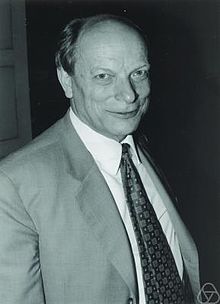Hans Hermes
| Hans Hermes | |
|---|---|

About 1970 in Oberwolfach
|
|
| Born |
February 12, 1912 Neunkirchen, German Empire |
| Died | November 10, 2003 (aged 91) |
| Theses |
|
| Doctoral advisor | Adolf Kratzer, Heinrich Scholz (1938), Ernst Peschl (1947) |
Hans Hermes (German: [ˈhɛʁmɛs]; 12 February 1912 – 10 November 2003) was a German mathematician and logician, who made significant contributions to the foundations of mathematical logic. Hermes was born in Neunkirchen, Germany.
From 1931, Hermes studied mathematics, physics, chemistry, biology and philosophy at the University of Freiburg. In 1937 he passed the state examination in Münster and was attending there in 1938 when the physicist Adolf Kratzer was present. After that he went on a scholarship to the University of Göttingen and then became an assistant at the University of Bonn. During World War II he was a soldier on the Channel Island of Jersey until 1943 and then on to the Chemical Physics Institute of the Navy in Kiel. At the end of the war he moved to Toplitzsee, where he was tasked with working on new encryption methods. In 1947, he became a lecturer at the University of Bonn where he took his habilitation, his thesis called Analytical manifolds in Riemannian areas. In 1949 he became a Professor at the University of Münster, where he turned back to the subject of mathematical logic.
Hans Herman was a pioneer of the Turing machine as the central concept of predictability. In 1937, Hermes reported under the title Definite terms and predictable numbers an article about the Turing machine, which still adheres closely to Turing ideas, but doesn't contain the concepts of the universal machine and the decision problem.
...
Wikipedia
